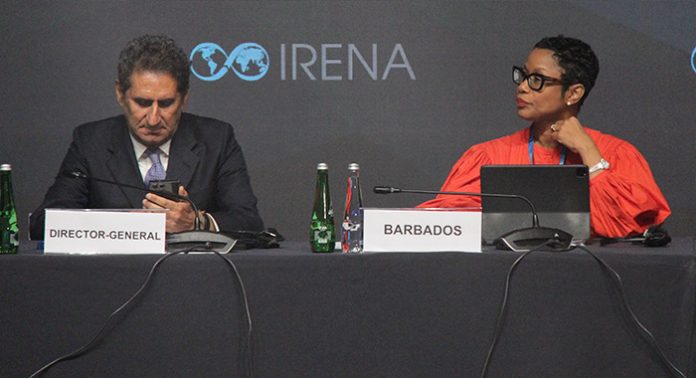Barbados Minister of Energy and Chair of the SIDS Ministerial at the 14th IRENA Assembly, Lisa Cummins Tuesday highlighted the significance of recent developments in climate action and energy transition during the outcome of the COP28 summit in Dubai last year.
This high-level event was convened under the theme of “Charting a Resilient and Sustainable Energy Future for SIDS”.
“Coming out of COP 28, the countries of the developing world, and particularly Small Island Developing States (SIDS) breathed a collective sigh of relief. Funding arrangements were pledged for the Loss and Damage Fund which offers protection for the poor and the most vulnerable to benefit from relief for addressing the impacts of climate disasters.
“It was a momentous occasion as the first ever international arrangement to transition away from fossil fuels was signed.
“Progress has been slow, and it has been hard, but we are here to capitalise on the momentum gained and to further advance as we seek to restrict the increase in temperature to 1.5 degrees above pre-industrial levels.
This is not just an important moment for us as SIDS, but a pivotal moment in the energy transformation,” Minister Cummins said in her remarks at the – Small Island Developing States (SIDS) Ministerial.
She said from the first global conference on sustainable development held in Barbados in 1994, SIDS have been on the forefront fighting: fighting to save our environment, fighting to save our nations, fighting to not be erased from the world map by rising sea levels and unnaturally powered natural disasters.
She stressed the need for new and equitable partnerships for sustainable development.
“I believe we can all agree that the SIDS Lighthouses Initiative (LHI) has been a significant advancement of that bold declaration.
“The SIDS Lighthouses Initiative brought together SIDS from around the world with developed countries, international organisations, development agencies, research institutes and private companies. It provides a partnership framework that facilitates support to accelerate decarbonisation in small island developing states and the strengthening of climate resilience,” she said.
Reflecting on the success of the initiative over the past decade, Cummins acknowledged achievements such as mobilising funds and deploying renewable energy capacity ahead of targets. However, she emphasised the need to reassess strategies and reaffirm commitment to meeting global targets for renewable energy and energy efficiency.
“Over the past 10 years the success of this initiative speaks for itself: the 2020 target of mobilising US$ 500 million, deploying 100 megawatts (MW) of new solar photovoltaic (PV) capacity, 20 MW of new wind power, significant quantities of small hydropower and geothermal energy, and requiring all SIDS to develop renewable energy roadmaps, as well as the 2023 target of 5 GW of installed renewable energy capacity were both achieved ahead of time.
“But this is not a time for nostalgia or a time to rest on our laurels. It is a time to reaffirm our commitment and reassess our strategies for much remains to be done. The global stocktake calls for a tripling of renewable energy capacity and a doubling of energy efficiency by 2030, and under the theme ‘Outcome of COP28: Infrastructure, Policies and Skills for Tripling Renewables and Accelerating the Energy Transition’, this will be our focus over the next two days.
“As SIDS, it is imperative that we lead globally and use our collective voices to champion the energy transition and climate action. Even though SIDS are varied and diverse in their global distribution and cultures, economic and political structures, languages and as many parameters as can used to assess and categorise, the challenges we face are similar,” she said.
Cummins highlighted the shared challenges faced by SIDS, including economic vulnerabilities and the need for access to long-term investments.
“Our small sizes and limited resource bases coupled with high dependencies on foreign trade results in our susceptibility to external economic shocks and natural hazards. As a result, the high debt to GDP ratios classifies us as high-risk territories which translates to a high cost of capital – a key barrier to attracting investments.
“SIDS face specific vulnerabilities such as the challenges of energy security and affordable energy services, as well as adaptation and mitigation to climate change. Despite this, SIDS have added a total renewable energy capacity of approximately 7.6 GW by the end of 2022. Despite the challenges of Covid, despite the high debt to GDP ratio, and despite natural disasters which we are exposed to annually, we have collectively doubled our renewable energy capacity over the last 10 years.
“Partnering with international entities and investors can lower the debt financing and such relationships are crucial for funding renewable energy projects and their associated infrastructure. However, access to long term investments is critical, and financing is a complex issue that requires a revolutionary approach for SIDS,” she stated.
Cummins said SIDS’ commitment to accelerating their energy transitions have been heavily focused on the electricity sector, but resilience and sustainable development demands that they agitate for the decarbonisation of the transportation and other end-use sectors.
“We cannot rely on the same systems and methodologies if we are to chart a resilient and sustainable energy future for SIDS. New paradigms and innovative solutions are required, or we will reach so far and no further,” she explained.
Discussing the Bridgetown Initiative, Cummins emphasised its role in reforming international financing arrangements to address the needs of SIDS and vulnerable countries.
“The transformational Bridgetown Initiative which addresses financing for climate resilience, is designed to reform the way rich countries finance poor countries in a climate crisis by preventing spiralling debt crises from successive natural disasters such as droughts, floods and hurricanes.
“It addresses the inherent imbalances hindering the international financing arrangements as it relates to SIDS and poor and vulnerable countries. It acknowledges that change in developmental financing is a requisite and allows the international community to focus on the humanity of SIDS and their economic realities,” Minister Cummins explained.














